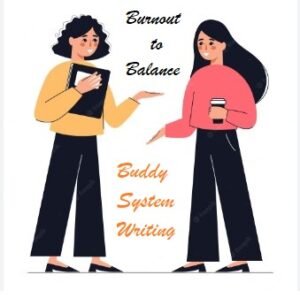Burnout to Balance – Buddy System in Writing – a Series
Tactic #1 – Buddy System Writing
14 February 2023
It’s serendipity that today of all the days in the year, that I’ve come to reflect on love outside the domain of the norm—lovers, partners, family members, parents and kids. Saint Valentines’ Day is befitting a celebration of all kinds of love but one that could fall in the cracks is the love and support of a fellow journeyman, long-hauler and a companion in the work trenches.
 As such, Today is a great day to honor my treasured writing partner. Us not being able to share the same space for a writing session today would not impact what output we each decide is the daily goal.
As such, Today is a great day to honor my treasured writing partner. Us not being able to share the same space for a writing session today would not impact what output we each decide is the daily goal.
In other words, her physical absence is inconsequential to the other’s writing productivity. Sure—it would be nice to break bread together afterwards, but not being able to do this does not negatively impact her epic value in my life. If that is not a definition of love then the dictionary needs rewriting.
A system emerges
I met the woman who would become my academic buddy in Fall 2018 when our location converged as she began doing fieldwork and data collection towards her project.
All we had in common in the beginning was that we both have been long-time adjunct professors, are never-ending researchers and seemingly life-long academics.
We hardly had time to indulge the friendship with social outings. The best we were able to do together was prioritized blocks of time where we read and wrote at our respective projects, but at least in the same spaces. Starbucks was our favorite spot.
To keep cost down, we each packed our own food and snacks but once there, we also patronized the store—just not to the extent that broke the bank with notoriously expensive coffee. Sarah returned to Denver, Colorado less than a year later, at the end of Summer 2019.
I felt her absence immediately. I stopped going to Starbuck to work. We had however, had barely enough time together and just enough individual focus to continue to touch base regularly about the problems and progress we were each making on our projects. Then a perspective shift happened that helped me revalue our shared interest and reframe our working relationship.
The Coach gets Coaching
One of my research administrators began to sing the praises of having a series of meetings with, not just a coach, but specifically an academic writing coach. He carried on and on about the coach’s ability to see through problems that he thought were intractable.
He was amazed at the coach’s ability to help him work through structural challenges in his case studies that would comprise his dissertation. Overall the academic writing coach helped him to become a better academic writer with a higher level of consistent output.
Of course I followed suit and signed up. In six sessions over three months, the academic writing coach also brought me to the point of moving past productivity issues that have long plagued my output. It was an amazing experience.
I can easily say it is in the top five best experiences of my long career as an academic and researcher. I wish I had had the benefit of academic coaching many years ago, I think I would have been far more organized and therefore a more prolific writer.
Of the many tactics that those sessions exposed me to, one of the most understated ones was Air & Light & Time & Space: How Successful Academics Write by Helen Sword (https://a.co/d/54rQ1IT).
It was recommended as supplemental reading but from which the coach structured some self-assessment exercises. It is a compliment to several other books I read through the years on the quest to become a more productive writer and to acquire a wider range of tools to share with my students, clients and mentees.
Apart from the Sword book, here are two others that are permanent fixtures in my home library. The first one is The Clockwork Muse by Eviatar Zerubavel (https://a.co/d/c06GKUo).
Buddy Writing Times
This is probably the first book that helped me figure out the fine art of knowing when to write by analyzing the differences between “A time” (when I am most creative and focused), “B time” when writing/academic matters that I have to do for a living should take place, and “C time” when I should be taking care of self, others and chores.
The second is Write no Matter What by Joli Jensen (https://a.co/d/iBl3MWs). This book is the first to prompt me rethink my writing habits along the lines of attaining higher productivity by forming a daily habit of it, to stop “binge writing” on weekends or holidays. It is less effective than a more consistent approach for so many good reasons.
Prior to those three books that are specifically geared to folks who are academics, I read three other books that set the wide foundation on which my professional life sits.
Buddy Writing Books
One of the early ones, more than a decade ago was The War of Art: Break Through the Blocks and Win Your Inner Creative Battles by Stephen Pressfield (https://a.co/d/gOKcsyB). This book opened my eyes to the fact that to create meaning with words daily is literally warfare with my self-defeating fears. He appropriately names the boogie-man that comes out every time I think about sitting to write, Resistance.
The books delves into its demystification with complex simplicity. The aim is to strip Resistance of its stranglehold over Productivity. It is an excellent weapon in the internal war that academic writing is—even as Helen Sword confirms—for experienced researchers.
While On Writing by Stephen King (https://a.co/d/39uawRe) is the only book I have read by this famous author, it is all I needed from a man whose wealth of experience on craft is as profound as it is varied. This book has a non-academic outlook on the topic but one that is helpful to locating the subject in the grander scheme of what it takes to be creative.
My coach’s reading list also introduced me to another gem for craft, Bird by Bird: Some Instructions on Writing and Life by Anne Lamott (https://a.co/d/gVJ6QtY). This book too, considers the juggle that is all the mundane aspects of life with the desire to be creative. It’s also drily funny so it is an overall pleasant read that is easy to breeze through.
A Buddy System
These books are the essentials that enabled me to design my Burnout2Balance system (see blog entry dated 31 January 2023 for an overview).
While I credit the concept to Helen Sword, I created the structure that makes tactic #1 work. Planning to circumvent burnout with a strategy of balance begins with enlisting support or as I call it, creating a buddy system in writing.
With the lessons learnt from my experiences with Sarah, her input and partnering, this tactic has been one in the tripod that sustains my academic productivity.
In daily life buddies are friends and family who help with responsibilities. These are people who will lend a hand, an ear and a shoulder when demands begin to feel overwhelming.
In an academic arena, this is someone who is a writing buddy or an accountability partner. Having to give an account of what I have and have not done. Sarah has helped me keep focus and inspired over several writing projects.
Although she lives more than 3,000 miles away from me and her research interests are totally dissimilar to mine, we are connected by the necessity of academic productivity. We account to each other on a near daily basis, for our academic outputs.
Having to state our goals and report on it, including failure to meet an objective, helps each of us to achieve our long-term individual writing goal—while remaining sane, grounded and generally, in balance with the rest of each of our lives.
Academic Buddy System
The buddy system allows us to vent our academic frustrations to someone who understands because they too are in academia. The specificity of this buddy system also facilitates each one of us to offer wonderful, meaningful solutions.
The differences in our daily conditions is accidental but one of those accidentals that is pure serendipity. We are often able to see the other’s problems and events from perspectives that bring a fresh take on seemingly intractable challenges.
Conclusion
Creating a Buddy System is one of three tactics in my Burnout2Balance academic writing program. Each tactic has a wide variety of perspectives, angles from which they can be approached with many avenues of individualization.
The brilliance of retooling time using these tactics is that once they are employed in the service of academic productivity, they are always available to the user henceforth.
The tactics become customizable for warding off burnout while in pursuit of professional goals. Fitness goals, business and entrepreneurship desires, domestic and family oriented aims. In short, the balance of any aspects of life in which there is a high risk of giving it all up for the sake of personal survival.
In my next article I will describe tactic #2: Boundaries. Do you want personalized help with using these tactics to achieve your own academic productivity? Begin with signing up for a free 30mins coaching consultation with me. See the Services tab on this page for the details.
 Early Fall, 2022: My writing partner Sarah (left) and me, taking a minute to soak in sights from the Royal Arch – part of which is behind us in the photo above.
Early Fall, 2022: My writing partner Sarah (left) and me, taking a minute to soak in sights from the Royal Arch – part of which is behind us in the photo above.
Pleased to complete a hike to the top of the 5th Flatiron in Boulder, Colorado. We sit and take in the view together. It was like finishing a challenging section of a paper or case study. We were tested and stretched, but we rested in the satisfaction of attainment.
Warning
***********
The concepts, images and content of this website are the intellectual property of the author, Rebecca Robinson. The contents are protected by international copyright laws. No part of this website can be borrowed, altered or used in any other form without the expressed, written consent of the author. Respect for the work of other authors is extended by the use of citations and a reference list if necessary.
Searches related to buddy system writing
buddy system meaning
buddy system examples
writing buddy online
buddy system pdf
buddy system for students
writer buddy ai
research buddies meaning
buddy system writing